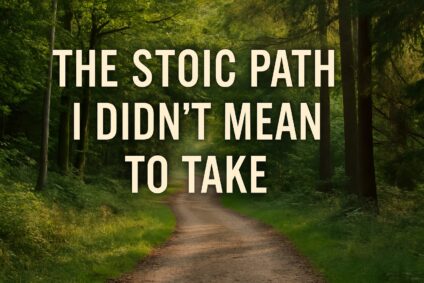The Stoic Path I Didn’t Mean to Take
I didn’t set out to become a student of Stoicism. In fact, for most of my life, if someone had described me as “Stoic,” I would’ve thought they meant I was cold, like Spock from Star Trek, but without the charisma.
But life, as it often does, had other plans.
The turning point came in the form of an offhand reply from my pastor. I shared a quote I used for a post some years ago. It was one of those slightly melancholic reflections on the brevity of life, and he simply replied: “Memento mori.” I had to look it up. Latin, it turns out. “Remember, you must die.” That unsettling phrase turned out to be a core Stoic teaching, one that invites us to live more honestly, more purposefully, and with fewer illusions about what we control.
That response, small as it was, set something in motion. It wasn’t a thunderclap revelation, just a tug. A reason to look closer. And the more I looked, the more I found, or maybe the more I was found. It felt a little like Public TV personality Bob Ross’s old line: “We don’t make mistakes, just happy little accidents.” My journey with Stoicism has been full of them. A string of odd little moments, stray quotes, and unexpected encounters. All pointing in the same direction, even when I didn’t know there was a direction.
I looked back at something I’d written a bit earlier, a post titled My Creed. It was meant as a personal reflection, a kind of moral inventory. But when I reread it with Stoicism on my mind, I was startled by how closely it lined up with Stoic thought, not just in tone, but in substance. Endure hardship. Practice virtue. Accept what is. Respect the holiness of ordinary days. The same ideas were there; I just hadn’t had the words for them yet.
Then came the fortune cookie. I’d had a quiet dinner and cracked open the fortune cookie, expecting the usual bland message. Instead, it read, “Inner peace is the ultimate form of success.” I saved that one. Not because it was profound, but because it was oddly timely. I’d been reading about the Stoic idea of ataraxia, tranquility, and this little scrap of paper from a nearby restaurant felt like a cosmic wink.
Of course, there were more traditional sources too. I started reading Marcus Aurelius, Seneca, and Epictetus. Their words didn’t feel like ancient wisdom so much as current commentary. In the middle of a political firestorm and a personal season of uncertainty, the reminders about control, resilience, and integrity felt not just helpful but urgent.
I attended a public radio event by Hidden Brain host Shankar Vedantam in Clearwater. He talked about James Stockdale: Resilience, Reality, and the Courage to Endure, a Vietnam War POW who survived brutal captivity by relying on the teachings of Epictetus. I hadn’t known that about him. The room got quiet, and I remember thinking, “Why am I hearing this here, now?”
And A Way Out fo No Way. Historian Heather Cox Richardson shared a memory of Lewis saying, “Do not get lost in a sea of despair. Be hopeful, be optimistic. Our struggle is not the struggle of a day, a week, a month or a year, it is the struggle of a lifetime.” He called us to respond to hate with love. There it was again…not Stoicism as a name, but as a presence. Lewis didn’t flinch from hardship. He kept his footing. And he urged us to do the same.
It started to feel like the universe was nudging me along, not with thunderclaps, but just enough that I’d notice. Quotes on Facebook. Sermons in church. Even lines from old political speeches. I came across something from William Wilberforce, the British abolitionist, who wrote, “You may choose to look the other way, but you can never say again that you did not know.” That sounds like Marcus Aurelius could’ve said it himself: duty, clarity, and action, all rooted in moral conviction.
None of these encounters were planned. Most didn’t even announce themselves as “Stoic.” But they carried the same undercurrent. A call to live with steadiness. To hold fast to your values. To meet the world as it is, not as we wish it were.
It’s funny, in hindsight, how often Stoicism appeared just when I needed it most, like someone slipping a note under the door at just the right moment. Maybe it’s just a matter of being open or tuning your ear to quieter things in life. Or maybe, as the Stoics might suggest, these things arrive not by accident, but by nature. Shaped by cause and effect, timing, and the larger rhythm of the world.
I don’t pretend to be a Stoic sage, far from it. I still complain more than I’d like. I get discouraged. I lose my patience with people. But I’m learning. And I’m paying attention now in ways I wasn’t before.
This journey began with a single phrase, memento mori, and it has unfolded in ways I couldn’t have predicted. That alone feels like a Stoic lesson. Don’t force the path. Just walk it.
And so, I will.
In the weeks ahead, I’ll be sharing some reflections on specific Stoic practices. Short essays that explore what they mean and how I’m trying (often imperfectly) to live them. Consider this piece the welcome mat. In the meantime, if you’re reading this on Deep Something, thank you for being part of the ride. Whether you came here by accident, by habit, or by your own tug toward something quieter and steadier. I’m glad you’re here.
Let’s see where this takes us.

